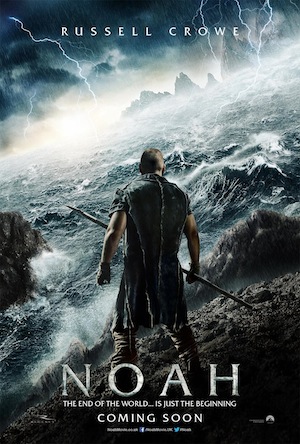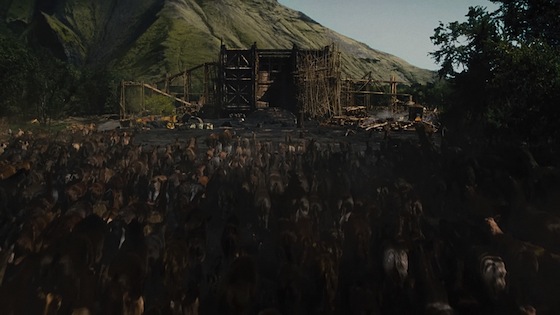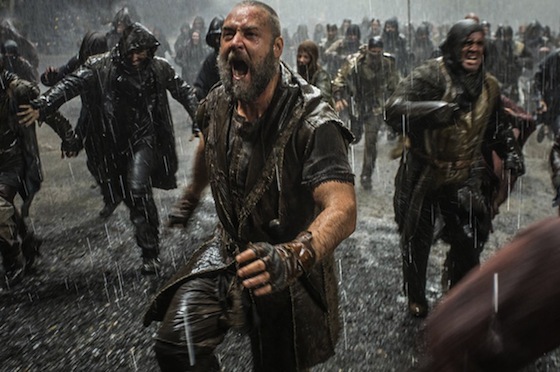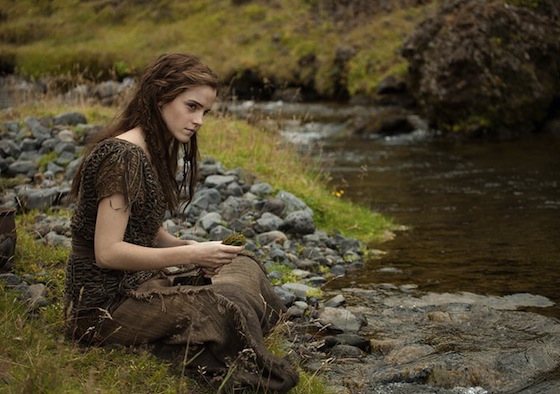 For good and for ill, Darren Aronofsky’s Noah is not the simple pastel-colored, children’s book rendering of the Bible’s story. When Aronofsky trains his sights on the philosophical questions of original sin, justice versus mercy, and the complex and troubling nature of Noah (Russell Crowe) and his family as representatives of all humanity, then Noah is a fascinating exploration that makes good use of a known story.
For good and for ill, Darren Aronofsky’s Noah is not the simple pastel-colored, children’s book rendering of the Bible’s story. When Aronofsky trains his sights on the philosophical questions of original sin, justice versus mercy, and the complex and troubling nature of Noah (Russell Crowe) and his family as representatives of all humanity, then Noah is a fascinating exploration that makes good use of a known story.
Unfortunately Darren Aronofsky strays from the philosophical and into the strip-mined territory of fantasy and religious spectacle. At times, this is a Lord of the Rings reboot of The Ten Commandments complete with lava rock versions of the Ents.
Let’s address the story itself. The biblical story of Noah, wherever you may find it, is a relatively short parable. Depending on volume and translation, it is about 5 to 10 pages long. We are told that, due to the wickedness of man, God is going to eradicate his creation. Noah is given a vision, and a timeline, after which God brings the rains and washes away all, save the innocent. After 120 days the waters recede, and Noah and his family start anew, as do the beasts and birds that were saved by the ark.
There is a lot of space to fill if Aronofsky wants to make an over 2-hour film. When he fills it with the questions that arise from the compact narrative, and puts these questions in human terms, the time is well spent.
 The overt ecological message, though apt, feels somewhat like a soapbox. Perhaps you didn’t know that Noah and his family were vegetarians, a point that is likely to rankle many a bible-thumping meat-eater. Aronofsky uses the character of Noah to emphasize God’s mandate for stewardship of his creation. Noah’s family only takes what they need.
The overt ecological message, though apt, feels somewhat like a soapbox. Perhaps you didn’t know that Noah and his family were vegetarians, a point that is likely to rankle many a bible-thumping meat-eater. Aronofsky uses the character of Noah to emphasize God’s mandate for stewardship of his creation. Noah’s family only takes what they need.
Noah’s struggles, beyond his dietary choice, are fascinating. While building the ark and collecting the animals (or allowing them to collect themselves), Noah can feel good about the justice and mercy that is to come. When the rains begin, and the waters rise, Noah must make himself complicit to a global genocide.
 With the help of ridiculous computer-generated fallen angels, Noah must fight off legions of desperate people. This scene is a battle spectacle worthy of The Two Towers, as the giant Watchers swat away gobs of tiny humans with each sweeping blow. It feels goofy when paired with the visions and internal struggles of Noah.
With the help of ridiculous computer-generated fallen angels, Noah must fight off legions of desperate people. This scene is a battle spectacle worthy of The Two Towers, as the giant Watchers swat away gobs of tiny humans with each sweeping blow. It feels goofy when paired with the visions and internal struggles of Noah.
Once safely inside the ark, Noah and his family listen as the throngs of “wicked’ people scream for help as they cling to outcroppings of rock and are battered by the rising waves. Thus emerges the mania and fanaticism of Noah, and the cruelty of justice.
It is easy to accept these details when they are glossed over in Sunday school stories. For this level of exploration, I applaud Aronofsky’s endeavors, but the battle scenes and collections of CG animals distract from these insightful complications.
 Noah is a weird and unsettling mix of cinematic spectacle and spiritual introspection that never quite works on either level. You should ignore any simple rating system that claims to suggest that Noah is a “good” or a “bad” film. There are moments in Noah that are filmmaking of the highest caliber, and there are entire scenes that are condemned to ill-conceived design or the need to explain something inexplicable.
Noah is a weird and unsettling mix of cinematic spectacle and spiritual introspection that never quite works on either level. You should ignore any simple rating system that claims to suggest that Noah is a “good” or a “bad” film. There are moments in Noah that are filmmaking of the highest caliber, and there are entire scenes that are condemned to ill-conceived design or the need to explain something inexplicable.
It’s a conflicted film, and perhaps that is point. You’ll just have to see Noah for yourself to find out.







Comments on this entry are closed.